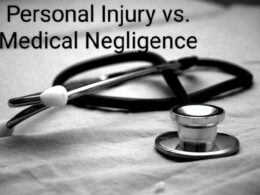Anyone who experiences a miscarriage, is likely going through a difficult and emotional time. Unfortunately, medical negligence can sometimes be a factor in miscarriages, which can make the situation even more devastating. While not all miscarriages are the result of medical malpractice, it is important to understand the signs of negligence and know your legal options.
Medical negligence can occur in many ways when it comes to miscarriages. For example, a doctor may fail to diagnose a condition that could lead to a miscarriage, or they may fail to provide adequate care during a high-risk pregnancy.
Furthermore, medical professionals may fail to properly monitor a pregnancy, leading to complications that could have been avoided. If you suspect that medical negligence was a factor in your miscarriage, it is important to seek legal advice as soon as possible.
This article aims to provide you with all you need about medical negligence after miscarriage.
Medical Negligence and Miscarriage
Medical negligence, also known as medical malpractice, occurs when a healthcare provider fails to provide a standard level of care that results in harm to the patient. In the case of miscarriage, medical negligence can occur if a healthcare provider fails to properly diagnose or treat a condition that leads to the miscarriage.
Causes of Miscarriage
Miscarriage is a common occurrence that affects many women. It can be caused by a variety of factors, including genetic abnormalities, hormonal imbalances, infections, and chronic illnesses. However, medical negligence can also be a cause of miscarriage.
Medical Negligence and Miscarriage
Medical negligence can play a role in miscarriage in several ways. For example, a healthcare provider may fail to diagnose or treat a condition that could lead to miscarriage, such as an ectopic pregnancy or a uterine infection. They may also fail to monitor a high-risk pregnancy properly, resulting in a miscarriage.
In some cases, medical negligence can occur during a procedure, such as a D&C (dilation and curettage) or a hysteroscopy, which can lead to complications that result in a miscarriage. Additionally, medical negligence can occur if a healthcare provider prescribes medication that is harmful to a developing fetus or fails to provide proper counseling on lifestyle changes that can reduce the risk of miscarriage.
It’s important to note that not all miscarriages are caused by medical negligence, and not all cases of medical negligence result in a miscarriage. However, if you believe that medical negligence played a role in your miscarriage, it’s important to speak with a qualified attorney who can help you understand your legal rights and options.
Medical Negligence After Miscarriage
If you have suffered a miscarriage, you may be wondering if medical negligence played a role in your loss. Medical negligence occurs when a healthcare provider fails to provide the standard of care that is expected of them, resulting in harm to the patient. In the case of a miscarriage, medical negligence can occur during prenatal care, labor and delivery, or after the loss of the baby.
Types of Medical Negligence After Miscarriage
There are several types of medical negligence that can occur after a miscarriage. These include:
- Misdiagnosis: If a healthcare provider fails to diagnose a miscarriage or misdiagnoses a miscarriage as a different condition, such as an ectopic pregnancy, it can delay necessary treatment and cause harm to the patient.
- Delayed treatment: If a healthcare provider fails to provide timely treatment for a miscarriage, it can lead to complications such as infection, hemorrhage, or infertility.
- Inadequate treatment: If a healthcare provider fails to provide appropriate treatment for a miscarriage, it can lead to complications such as incomplete miscarriage, retained products of conception, or uterine perforation.
Symptoms of Medical Negligence After Miscarriage
If you have experienced any of the following symptoms after a miscarriage, it may be a sign of medical negligence:
- Heavy bleeding or prolonged bleeding
- Severe pain or cramping
- Fever or chills
- Foul-smelling discharge
- Abdominal tenderness or swelling
- Dizziness or lightheadedness.
Legal Remedies for Medical Negligence After Miscarriage
If you believe that medical negligence played a role in your miscarriage, you may be able to seek legal remedies. Depending on the circumstances of your case, you may be able to file a medical malpractice claim against the healthcare provider or hospital responsible for your care. Damages may include compensation for medical expenses, lost wages, pain and suffering, and more.
It is critical to speak with an experienced medical malpractice attorney who can review your case and help you understand your legal options. They can guide you through the legal process and help you obtain the compensation you deserve.
Medical Malpractice and Miscarriage
Medical malpractice occurs when a healthcare professional fails to provide the standard of care expected of them, resulting in harm to the patient. In the context of miscarriage, medical malpractice can occur if a healthcare professional fails to provide adequate care during pregnancy, delivery, or postpartum care, resulting in harm to the mother or the loss of the fetus.
Causes of Miscarriage
Miscarriage can occur for a variety of reasons, including genetic abnormalities, hormonal imbalances, infections, and medical conditions such as diabetes or thyroid disease. However, medical malpractice can also be a cause of miscarriage. Examples of medical malpractice that can lead to miscarriage include:
- Failure to diagnose or treat an ectopic pregnancy
- Failure to diagnose or treat infections that can lead to miscarriage
- Failure to monitor a high-risk pregnancy
- Negligent use of medications that can cause harm to the fetus
Medical Malpractice and Miscarriage
If you have experienced a miscarriage and suspect that medical malpractice may have been a contributing factor, it is important to seek legal advice as soon as possible. A medical malpractice lawsuit can help you recover damages for the harm you have suffered, including medical expenses, lost wages, and pain and suffering.
To prove medical malpractice in a miscarriage case, you will need to show that the healthcare professional responsible for your care deviated from the standard of care expected of them, and that this deviation was the direct cause of your miscarriage. This can be a complex and challenging process, and it is important to work with an experienced medical malpractice attorney who can help you navigate the legal system.
Remember, not all miscarriages are the result of medical malpractice, and not all cases of medical malpractice result in miscarriage. However, if you believe that medical malpractice may have played a role in your miscarriage, it is important to seek legal advice to protect your rights and hold those responsible accountable for their actions.
Medical Malpractice After Miscarriage
Experiencing a miscarriage can be a traumatic event, and if you suspect that it was caused by medical malpractice, it can be even more devastating. Medical malpractice after miscarriage can take many forms, and it is important to understand the different types of malpractice, symptoms, and legal remedies available to you.
Types of Medical Malpractice After Miscarriage
Medical malpractice can occur in many ways after a miscarriage. Some examples include:
- Failure to diagnose or treat a condition that led to the miscarriage
- Misdiagnosis of the cause of the miscarriage
- Delayed diagnosis or treatment of a condition that led to the miscarriage
- Surgical errors during a procedure related to the miscarriage
- Prescription errors or medication mistakes.
Symptoms of Medical Malpractice After Miscarriage
After a miscarriage, it can be difficult to determine whether medical malpractice occurred. However, there are some symptoms that may indicate malpractice, including:
- Severe pain or bleeding that was not addressed by medical professionals
- Misdiagnosis of the cause of the miscarriage
- Delayed diagnosis or treatment of a condition that led to the miscarriage
- Surgical errors during a procedure related to the miscarriage
- Prescription errors or medication mistakes
If you experience any of these symptoms, it is important to seek medical attention immediately and consult with a medical malpractice attorney.
Legal Remedies for Medical Malpractice After Miscarriage
If you believe that medical malpractice led to your miscarriage, you may be entitled to legal remedies. These can include:
- Compensation for medical expenses related to the miscarriage
- Compensation for lost wages or income
- Compensation for pain and suffering
- Punitive damages to punish the medical professional or facility for their negligence.
To pursue legal remedies for medical malpractice, you will need to consult with a medical malpractice attorney who can evaluate your case and determine the best course of action.
In a nutshell, experiencing a miscarriage is a difficult and emotional event, and if you suspect that it was caused by medical malpractice, it can be even more overwhelming. Understanding the types of malpractice, symptoms, and legal remedies available to you can help you make informed decisions about your healthcare and legal options.
Complications After Miscarriage
Experiencing a miscarriage can be a difficult and emotional time for anyone. Unfortunately, miscarriages can also lead to complications that require medical attention. In this section, we will discuss the types of complications that can occur after a miscarriage, the symptoms to watch out for, and the medical treatment options available.
Types of Complications After Miscarriage
Some of the most common complications after a miscarriage include:
- Infection: An infection can occur if any tissue from the pregnancy remains in the uterus. Symptoms of infection include fever, chills, abdominal pain, and foul-smelling discharge.
- Heavy bleeding: Heavy bleeding can occur if the uterus does not contract properly after the pregnancy loss. This can lead to anemia, dizziness, and fatigue.
- Asherman’s Syndrome: This is a rare condition that can occur if the lining of the uterus is scarred after a miscarriage. This can lead to infertility and other complications.
Symptoms of Complications After Miscarriage
It is important to seek medical attention if you experience any of the following symptoms after a miscarriage:
- Heavy bleeding that lasts longer than two weeks
- Severe abdominal pain
- Foul-smelling discharge
- Fever or chills
- Dizziness or fainting
- Signs of depression or anxiety.
Medical Treatment for Complications After Miscarriage
The type of medical treatment you receive will depend on the specific complication you are experiencing. Some common treatments include:
- Antibiotics: If you have an infection, your doctor may prescribe antibiotics to clear it up.
- Dilation and curettage (D&C): This procedure may be necessary if there is any tissue remaining in the uterus after a miscarriage.
- Hormone therapy: Hormone therapy may be used to help the uterus contract and prevent heavy bleeding.
- Surgery: In rare cases, surgery may be necessary to treat complications such as Asherman’s Syndrome.
In conclusion, while complications after a miscarriage can be scary, it is important to seek medical attention if you experience any symptoms. With prompt and appropriate treatment, most complications can be successfully treated.
Preventing Medical Negligence and Malpractice
When it comes to medical care, preventing medical negligence and malpractice is crucial. This is especially true during prenatal care and after a miscarriage. By taking steps to prevent medical negligence, healthcare providers can protect their patients and avoid legal consequences. Here are some ways to prevent medical negligence and malpractice:
Importance of Prenatal Care
One of the best ways to prevent medical negligence and malpractice is to prioritize prenatal care. During prenatal care, healthcare providers can identify potential risks and complications, monitor the health of the mother and fetus, and provide education and support to expectant parents. By attending all prenatal appointments and following your healthcare provider’s recommendations, you can help ensure a healthy pregnancy and reduce the risk of medical negligence.
Standards of Care for Healthcare Providers
Another way to prevent medical negligence and malpractice is to adhere to the standards of care for healthcare providers. These standards outline the level of care that healthcare providers should provide to their patients. By following these standards, healthcare providers can help prevent medical negligence and malpractice. Some examples of standards of care for healthcare providers include:
- Providing accurate and timely diagnoses
- Developing and following treatment plans based on the patient’s needs
- Communicating effectively with patients and their families
- Maintaining accurate medical records
Legal Consequences for Medical Negligence and Malpractice
While preventing medical negligence and malpractice is important for patient safety, it is also important to consider the legal consequences. Medical negligence and malpractice can result in lawsuits, damages, and loss of reputation for healthcare providers. By taking steps to prevent medical negligence and malpractice, healthcare providers can protect themselves from legal consequences. Some legal consequences of medical negligence and malpractice include:
- Lawsuits for medical malpractice
- Loss of license or certification
- Fines and penalties
- Damage to reputation and business
In conclusion, preventing medical negligence and malpractice is crucial for patient safety and legal protection for healthcare providers. By prioritizing prenatal care, adhering to standards of care, and understanding the legal consequences, healthcare providers can provide high-quality care and avoid legal issues.
Frequently Asked Questions
Can legal action be taken for medical negligence resulting in fetal death?
If you suspect that medical negligence caused the fetal death, you may be able to take legal action. It is important to seek legal advice as soon as possible to determine your options.
What are the common causes of fetal death?
Fetal death can be caused by a variety of factors, including genetic abnormalities, infections, medical conditions, and complications during pregnancy or delivery.
What are the legal options for parents in case of fetal death?
Parents of a fetus who has died may be able to pursue a wrongful death lawsuit against the healthcare provider or hospital responsible for the care of the mother and fetus. Compensation may be available for medical expenses, emotional distress, and other damages.
What are the responsibilities of healthcare professionals in case of fetal death?
Healthcare professionals have a duty of care to provide safe and effective treatment to their patients. In the case of fetal death, they must follow proper procedures to diagnose and treat any underlying conditions that may have contributed to the loss. They must also provide support and guidance to the parents during this difficult time.
What are the emotional and physical consequences of fetal death?
Fetal death can have a profound impact on parents, both emotionally and physically. Parents may experience grief, depression, anxiety, and other mental health issues. They may also experience physical symptoms such as pain, bleeding, and infection.
What is the process of filing a lawsuit for fetal death?
The process of filing a lawsuit for fetal death involves seeking legal advice, gathering evidence, and filing a complaint in court. The case may be resolved through negotiation or trial. It is important to work with an experienced attorney who can guide you through the process and help you achieve the best possible outcome.
Conclusion
In conclusion, if you have experienced a miscarriage and believe that medical negligence may have played a role, it is important to seek legal advice. While it can be challenging to prove that medical malpractice was responsible for the loss of pregnancy, there are ways to expose that a medical professional was negligently responsible for the miscarriage.
It is crucial to gather as much evidence as possible, including medical records, test results, and witness statements. A medical expert may need to review your case to determine whether there was negligence involved.
If you do decide to pursue legal action, it is important to choose an experienced attorney who specializes in medical malpractice cases. They will be able to guide you through the legal process and help you understand your rights and options.
Remember that you have the right to hold medical professionals accountable for their actions. If you believe that you have been a victim of medical negligence, it is important to speak up and seek justice.
We hope that this article has provided you with valuable information about medical negligence after miscarriage. While it can be a difficult and emotional topic to discuss, it is important to understand your rights and options. If you have any further questions or concerns, do not hesitate to seek legal advice.
YOU SHOULD ALSO READ:
- What Are The Elements of a Medical Negligence Claim
- How Much Compensation Can You Claim for Death by Medical Negligence?
- Medical Negligence and Consumer Protection Act: What You Need to Know
- What Are The 5 Common Medical Negligence Cases?
- 9 Valid Reasons for Delay in Submission of Medical Claim












